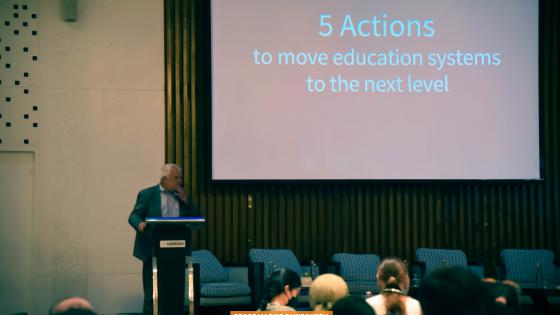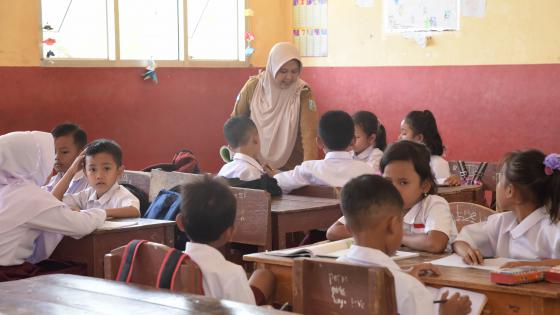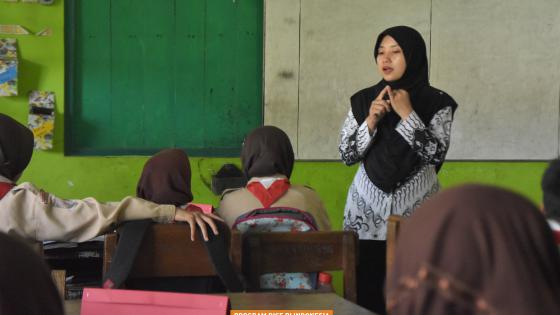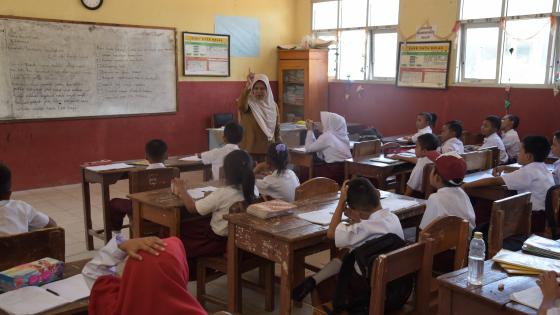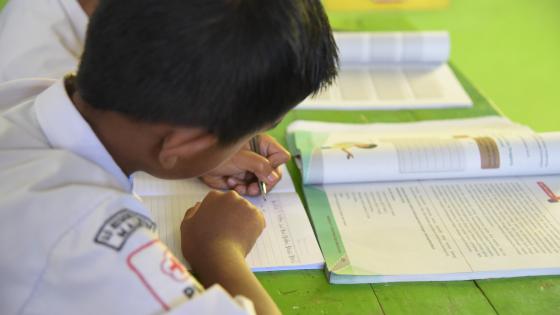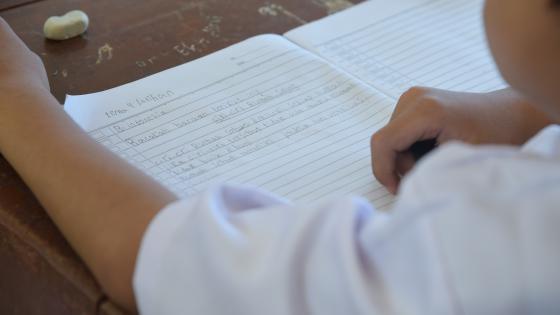Photo illustration: Mukti Mulyana
.
This article was originally posted on The Conversation Indonesia and has been translated by RISE team.
.
The “Freedom to Learn” or “Merdeka Belajar” policy launched by the Minister of Education and Culture, Nadiem Makarim, last December, centers only on schools.
There are four policies that are school-centered: the National Standardised School Examination (USBN) whose administration is now left to schools, the National Examination (UN) whose graduation assessment model is converted, the simplified lesson plan, and the more flexible zoning-based admission system.
In fact, learning outcomes are essentially influenced by families, schools, and communities or so-called the tricenter of education, as formulated by the Father of Indonesian education, Ki Hadjar Dewantara.
In education, the main actors in the family are the parents, while the important figures in the school are the teachers, and the distinctive representatives in the community are the governments both at central and regional levels.
The pilot project of “Family School” or Sekolah Keluarga in Bukittinggi can be an example of how these three elements work hand-in-hand to improve children’s education quality starting from their family.
Parents educate their children’s character at home, teachers teach knowledge and skills to their students, and the government directs education services through various policies.
Without strengthening the tricenter of education concurrently, it will be difficult to expect the quality and character of students to increase significantly.
The Family School Programme in Bukittinggi
There is a glimmer of hope from Bukittinggi on how to increase the role of the family in education.
In early December 2019, as a researcher in a research that aimed at improving the education system in Indonesia (RISE), I participated in a group discussion with some parents from multiple primary schools in Bukittinggi.
They agreed that the center for character education should be the family, while the center for academic teaching (knowledge) is the school.
This discussion forum also put forward two ideas. First, it is necessary to develop a stage for students to apply character education taught in their family through association in school and community. Second, it is necessary to provide space for children to practice their knowledge and reasoning skills acquired in school in their daily lives in the family and community.
As an effort to prepare the future generation with the support of great parents, the Bukittinggi City government has implemented the Family School programme since 2018. In the first two years of its implementation, the participants of the Family School were mostly mothers. In the future, this programme will also target fathers and youth/teenagers, both male and female.
Starting in 2020, the Family School will be held in every village. Participants in each batch must commit to attending at least twelve of the sixteen scheduled weekly meetings. Some stopped halfway. Those who dropped out are allowed to rejoin the next batch.
The learning materials consist of eight family functions relevant to the tasks of nurturing and raising their children. These functions delivered in twenty subject matters, among others (1) teaching religious values in the family; (2) being great parents; (3) children's rights; (4) correct, good, and fun communication; (5) involving families in education units; (6) nurturing children in the digital era; and (7) sexuality and puberty education in children.
The Family School teachers are government officials (vertical and regional), academics, community leaders, religious leaders, traditional leaders, and entrepreneurs. They are not paid, except for visiting teachers who are brought in from outside Bukittinggi.
Increasing family capacity through parents
The Family School in Bukittinggi is a good example of a programme that aims to maintain the capacity of parents to nurture and raise their children. In essence, every parent has the awareness and desire to see the success of education and the future of their children.
The Family School have been relatively successful in caring for parents’ behavior in interacting with their children. Some statements from parents in group discussions indicated a change in parents' knowledge, awareness, and behavior:
"I try to welcome and pay attention to our children's stories when they come home from school, which I had never done before."
“I reduce my working hours as a tailor so I can sit with my children when they study—I used to work from morning to night.”
"I am more aware that the responsibility of parents in our children’s education is actually greater than teachers."
"I share the knowledge to my neighbours who have problems with their children."
In the end, Ki Hadjar Dewantara's idea of the tricenter of education remains relevant to always be considered a unified foundation in various educational reform policy formulations, which are still partial to date.
Partial policies are insufficient
The government’s current partial approach to reform the education system is visible in its two priorities: improving the quality of students as well as strengthening the character of school graduates. Both are centered at school.
Schools, whose main actors are teachers, are indeed an essential component of education. However, in reality, more than half of the approximately three million teachers did not meet the passing score of the Teacher Competency Test (UKG).
Meanwhile, the 2019 RISE report on training practices to improve teacher competencies indicated unsatisfactory results. The design and objectives of teacher training were not entirely in line with the needs of teachers, among others, due to (i) the inaccuracy of teacher competency mapping and (ii) infrastructure pedagogical ability did not meet the expectations and the needs of participants.
As a result, there is a large gap in the capacity differences between teachers in interacting with students. This problem is related to, among others, differences in the weight of interest in becoming a teacher, the quality of pre-service teacher education, and work experience as a teacher.
The condition of the education bureaucracy
Changes in the partial system are exacerbated by the conditions of the regional education bureaucracy.
Officials tend to be secretive, difficult to change and adapt to technological developments, even though basic education for primary and junior secondary levels is under the authority of the district/city government.
A visionary central government policy would be in vain if not implemented by a visionary regional government/education office.
There is wide variation in the capacity of regional governments to manage education services.
In early 2018, for example, RISE tried to call sixty-four district education office officials of regions with high national examination scores. We assumed that these districts have innovations in education services.
Before making the calls, we asked the Agency of Research and Development of the Ministry of Education and Culture to send notification letters to the sixty-four education offices requesting the offices to facilitate RISE through telephone surveys regarding their innovations in education services.
But most of them refused to be interviewed. This means that their “innovations”, if any, cannot be identified for policy learning for other regions or for evaluating their own policies.
It is indeed rare to hear of regional governments who dare to innovate in managing their education services. Most only think and work routinely to implement policies delegated from the central government as they have been for decades.
In this context, increasing the capacity of families and district/city education offices should also be a priority apart from “Merdeka Belajar” in schools.


